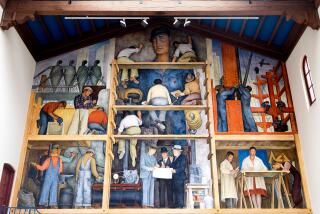Ex-Barnes Foundation CEO: We weren’t bankrupt, but saying so helped
- Share via
The new Barnes Foundation museum has just opened in Philadelphia, and now comes a startling comment from a former Barnes executive: No financial crisis really existed when trustees went to court a decade ago to ask permission to build a new museum.
Desperate financial need was widely claimed as a leading reason for the still-controversial decision to move the astounding trove of paintings by Cézanne, Matisse, Seurat and dozens more from their historically incomparable home in suburban Merion, Pa., to a big, shiny new tourist-site downtown. A local court agreed to what had been portrayed as a heroic rescue effort based on urgent financial necessity.
Kimberly Camp, who actively supported the move, was president and chief executive of the Barnes from 1998 to 2005 when the fight took place. She’s writing a book on the move and surrounding controversy. Camp winds up a recent blog post on her website with this observation -- which she accurately characterizes as jaw-dropping -- that reflects on her visit to the May dedication of the new museum:
“The Barnes has always belonged in Merion. Its circumstance required its relocation. That circumstance was not bankruptcy. I shared that fact with a reporter a few weeks before the opening, and he told me that I had dropped his jaw. Bankruptcy was not the reason we filed the petition to move the Foundation to the city. At the time the petition was filed, the Barnes Foundation had a cash surplus and we had no debt -- none. But, saying so made the rescue so much more gallant.”
Gallant? Camp doesn’t elaborate on the actual circumstance requiring relocation; but making a venal act appear noble lent a certain glow to the court battle over wrecking the nation’s primary cultural achievement of the 20th-century’s first half. The 2002 court ruling allowing the Barnes Foundation move is the art-world’s Bush vs. Gore.
How widespread is the misconception that financial ruin compelled the move? Here’s architecture critic Martin Filler writing in the July 12 New York Review of Books:
“Although substantial funds were realized during the 1990s through a major book deal and a lucrative international tour of the [Barnes] collection while the gallery building was being restored, the Barnes was effectively bankrupt by the turn of the millennium. In 2002 the beleaguered Barnes board petitioned a court to let them break Albert Barnes’s trust indenture and move his art to the center of Philadelphia in order to make it more convenient to the general public -- admission had been by appointment only and was severely limited -- and thereby alleviate the institution’s fiscal crisis.”
Camp, who was running the place in 2002, now affirms what many already knew -- no fiscal crisis existed -- and she offers sympathy-generation (or fear-mongering) as a reason for fudging the fact as the wrecking crew went off to court. Filler’s was easily the most embarrassing restatement of establishment propaganda about the deed, which ranks right up there with the demolition of New York City’s Penn Station on the scale of historic preservation disasters in the modern era. But his was not the only one.
Barnes Watch, the citizens group that struggled against insurmountable odds to prevent the move, on Monday filed a petition to the Superior Court of Pennsylvania. The Barnes Watch attorney’s letter asks for a hearing based on Camp’s statement, “since apparently false information was presented” during the initial trial.
RELATED:
Barnes Foundation’s disputed relocation is upheld by judge
Architecture review: A poor replica of Barnes Foundation museum
Art review: Barnes Foundation museum a bland shadow of once great self
More to Read
The biggest entertainment stories
Get our big stories about Hollywood, film, television, music, arts, culture and more right in your inbox as soon as they publish.
You may occasionally receive promotional content from the Los Angeles Times.











